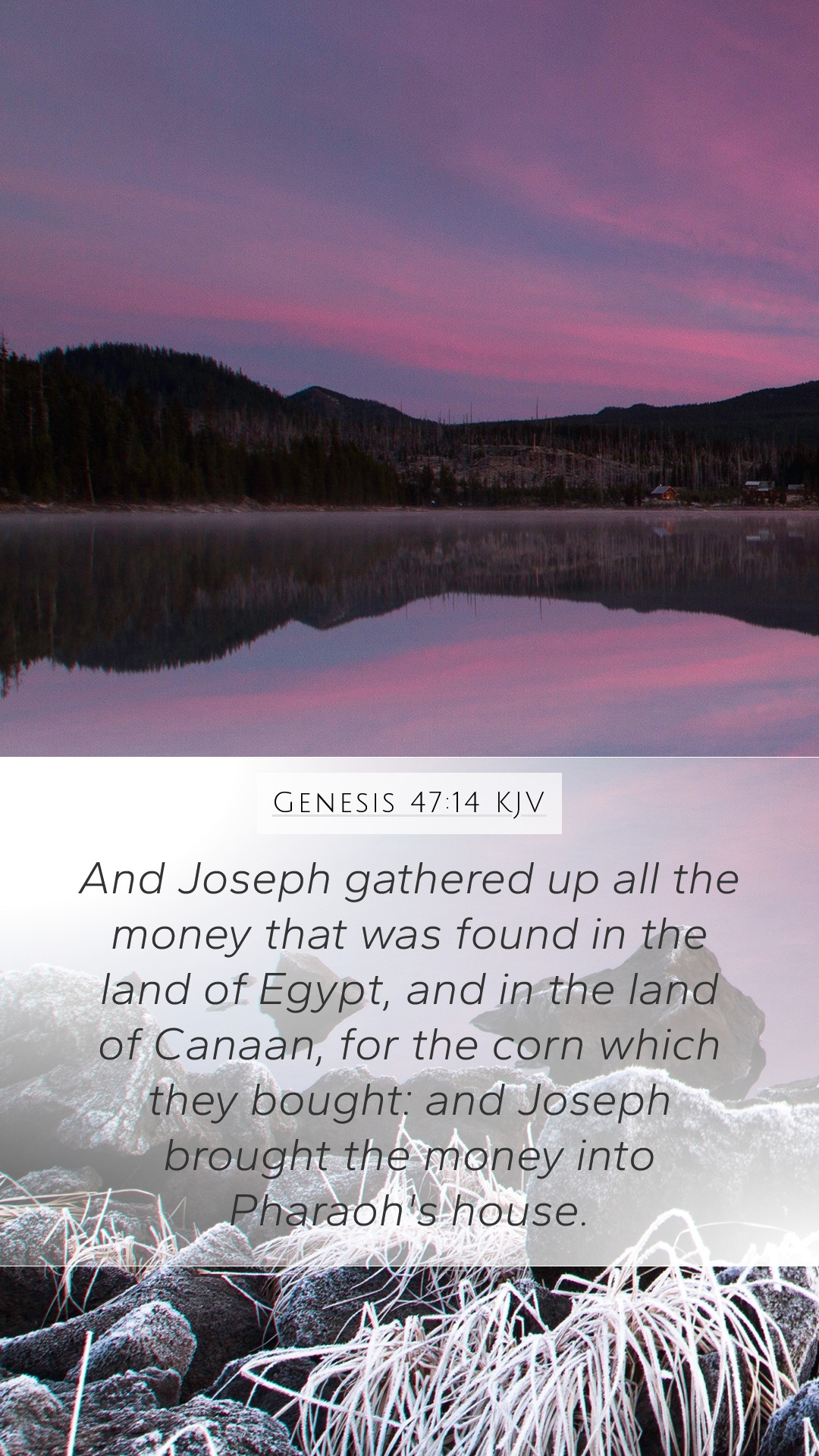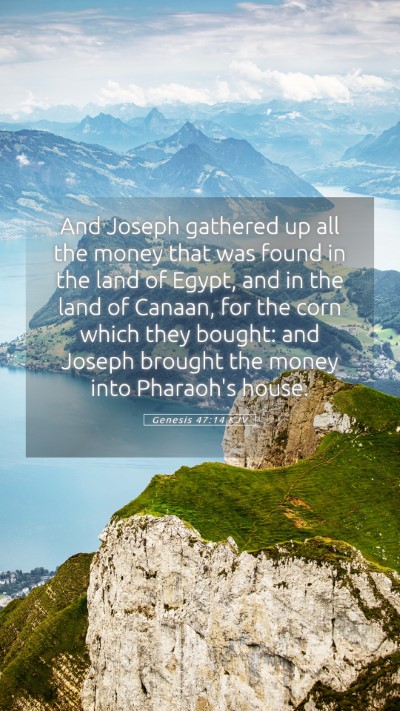Genesis 47:14 - Understanding the Scriptures
The verse Genesis 47:14 states:
"And Joseph gathered up all the money that was found in the land of Egypt, and in the land of Canaan, for the corn which they bought: and Joseph brought the money into Pharaoh's house."
This passage occurs during a significant moment in the narrative of Joseph's administration over Egypt during a time of famine. Let's delve into the Bible verse meanings and interpretations by combining insights from public domain commentaries, including those by Matthew Henry, Albert Barnes, and Adam Clarke.
Verse Context and Analysis
In this chapter, Joseph, who has risen to power in Egypt, is in charge of managing the food supply amidst the severe famine that affects not only Egypt but also the surrounding lands. The process of gathering money for the grain illustrates several key themes in Biblical exegesis.
Key Themes
- God's Providence: The gathering of money signifies God's providential care for His people during a crisis. Through Joseph, He ensures sustenance and provision, highlighting the importance of reliance on God in times of need.
- Economic Exchange: This verse illustrates the economic principles of the time, showing how Joseph's actions were not merely humanitarian but also strategic for the Egyptian economy. It reflects Joseph's wisdom in administration and leadership.
- Provision for the Future: The consolidation of resources can be seen as foreshadowing further hardships but also the future prosperity of Egypt. Joseph's foresight in gathering wealth foreshadows the abundance that will ultimately protect the land.
Commentary Insights
Each commentary offers valuable insights into the deeper meanings of the verse:
Matthew Henry's Commentary
Matthew Henry emphasizes God's sovereignty in Joseph's actions. He highlights that all wealth ultimately belongs to God, and through Joseph, God orchestrated the events to fulfill His plan. The gathering of funds was not just a transactional action but a demonstration of divine provision.
Albert Barnes' Commentary
Albert Barnes speaks to the political and social implications of this gathering. He points out that Joseph's collection of money was essential in establishing Pharaoh's dominance during the famine. This act solidified the ruler's power while ensuring the people had access to food, albeit at a cost.
Adam Clarke's Commentary
Adam Clarke focuses on the moral implications and the character of Joseph. He notes that Joseph handled funds with integrity and responsibility, which further justifies his authority. Clarke reflects on the ethical considerations of wealth distribution during crises, prompting readers to reflect on contemporary issues of economics and ethics in their own lives.
Application and Significance
Understanding Genesis 47:14 offers practical applications beyond its historical context. The insights allow for Bible study groups and individuals engaging in online Bible study to explore how they relate to topics such as:
- Financial Stewardship: The lesson on how to manage resources wisely reflects upon personal and communal financial practices.
- Trust in Leadership: Joseph's leadership can prompt discussions on the importance of righteous leadership and governance.
- Preparedness in Adversity: Just as Joseph prepared for famine, modern believers can discuss the significance of planning and preparedness in their own lives.
Cross References
Genesis 47:14 resonates with several other scriptures that echo similar principles:
- Proverbs 21:20: "There is treasure to be desired and oil in the dwelling of the wise; but a foolish man spendeth it up."
- Genesis 41:30-31: "And there shall arise after them seven years of famine; and all the plenty shall be forgotten in the land of Egypt..."
- Genesis 45:11: "And there will I nourish thee; for yet there are five years of famine..."
Conclusion
In conclusion, Genesis 47:14 provides a layered understanding of how God’s providential plan unfolds within the realm of human actions and historical events. Whether examining the economic systems of the past or reflecting on current theological principles, this scripture encourages deep reflection on the importance of stewardship and reliance on divine providence. Each Bible verse carries profound meanings and interpretations that can guide us in our daily lives, affirming the relevance of Scripture analysis in understanding both historical and contemporary issues.


